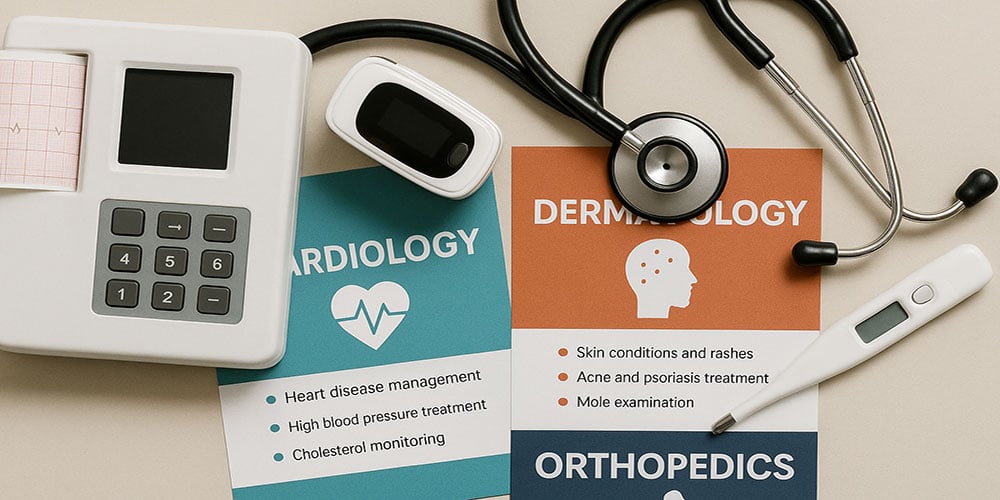Personalization in Healthcare: Boosting Patient Engagement & Outcomes
Streamworks Blog

In today's on-demand world, personalization isn't just a buzzword, it's a patient expectation. From customized playlists to tailored shopping experiences, people are used to interactions that recognize their unique preferences. A one-size-fits-all approach doesn't cut it anymore. Whether you're engaging patients through digital channels, direct mail, or in-person care, personalization is the key to building trust, improving outcomes, and creating meaningful connections. Personalized experiences in healthcare leverage technology and diverse data sources to create tailored care journeys that improve health outcomes and patient engagement. These personalized approaches are essential for enhancing the patient's experience throughout their healthcare journey.
Builds Trust and Strengthens Patient Relationships
At its core, healthcare is about relationships. When communication feels personal and relevant, patients are more likely to engage. Whether it's addressing patients by name, referencing a past appointment, or acknowledging specific health concerns, small touches go a long way in making patients feel seen and valued. Personalized communication shows that your organization isn't just treating a condition, it's caring for a person.
This sense of individualized attention fosters emotional connection, loyalty, and long-term commitment to care. Supporting emotional well being is a crucial part of personalized healthcare relationships, helping patients feel understood and cared for beyond just their physical health. Patients are more willing to share sensitive information, follow medical advice, and stay with a primary care provider who makes them feel heard. In diverse or underserved communities, personalized communication can also help bridge cultural gaps, reduce perceived bias, and make healthcare feel more approachable. In the long run, these deeper relationships contribute to better health outcomes for all.
Improves Patient Engagement
Personalized outreach, like appointment reminders, wellness tips, or treatment options based on an individual's history gets noticed. When patients feel like you're speaking to them, they're far more likely to respond, follow through, and participate in their care journey. Implementing tailored engagement strategies can further enhance patient participation and satisfaction by addressing the unique needs of different patient segments. This can lead to improved outcomes, and a more active, empowered patient population, benefiting both patients and providers through increased satisfaction and better health management.
Personalization also helps address emotional and psychological needs. Tailored messaging can reduce anxiety, enhance motivation, and make patients feel respected and understood. Ultimately, this level of individual attention leads to better medication adherence, reduced no-show rates, and healthier long-term behaviors.

Supports Preventive Care, Wellness, and Health Outcomes
Personalization allows healthcare providers to shift from reactive to proactive care. By analyzing patient data such as family history, lifestyle habits, and biometrics, providers can identify risk factors early and intervene with targeted wellness strategies. Providers may recommend lifestyle changes, such as increasing physical activity, to prevent the onset and progression of chronic disease. Personalized reminders for screenings, vaccinations, and checkups ensure that patients receive timely preventive services tailored to their individual needs and risks.
Over time, a proactive approach can improve quality of life and reduce costly emergency visits by enabling early intervention and personalized care to treat disease more effectively and prevent the progression of chronic disease. This is a powerful strategy to build a healthier and more resilient patient population while easing the operational burdens on healthcare systems.
Enhances Communication Across Channels
From emails and text messages to direct mail and patient portals, personalization should be baked into every touchpoint. With the right tools and segmentation strategies, healthcare marketers can create consistent, cross-channel experiences that feel relevant. Digital tools, such as visual simulation devices, can help communicate complex information and personalize patient education by demonstrating potential treatment outcomes in a relatable way. This means tailoring not only the content but also the timing, channel, and tone of each message based on patient behaviors.
A seamless, personalized experience across platforms reinforces brand trust and ensures patients receive the right information at the right time. Providing educational materials supports patient understanding, self-management, and access to relevant community programs, further improving health outcomes. When patients recognize continuity and intentionality in the way they're communicated with, it reduces friction, encourages engagement, and improves satisfaction.
Meets Rising Consumer Expectations
Patients today expect healthcare experiences to mirror what they get in other industries - convenient, responsive, and tailored to them. In an age where Amazon knows your preferences and Netflix curates your viewing, healthcare consumers increasingly demand the same level of ease. They want appointment scheduling, reminders, billing, and care follow-ups to be available on the channels they prefer. Virtual care and remote monitoring are meeting these expectations by providing accessible, personalized health services through digital platforms, enabling patients to receive care and share health data with providers from anywhere.
Organizations that deliver on this front will not only attract new patients but also retain existing ones, build long-term loyalty, and position themselves as patient-centric leaders. Those who don't? Risk being seen as outdated, impersonal, or unresponsive.
Personalization in healthcare isn't just about better marketing, it's about better care. By leveraging data, empathy, and smart communication strategies, healthcare providers can connect with patients on a deeper level, improve health outcomes, and build trust in an increasingly competitive landscape.

Care Coordination and Artificial Intelligence
Care coordination is at the heart of personalized health care, and artificial intelligence (AI) is rapidly transforming how healthcare providers deliver this essential service. By harnessing the power of AI, many healthcare organizations are able to streamline care delivery, improve patient engagement, and boost health outcomes across diverse patient populations.
AI-powered care coordination systems analyze vast amounts of patient data—including medical history, medication adherence, and lifestyle factors—to identify patients who may need extra support, especially those managing chronic conditions or complex health needs. This enables healthcare providers to develop targeted therapies and personalized care plans that address each individual's unique health status, improving both clinical outcomes and the overall patient experience.
Beyond identifying patients at risk, AI helps healthcare organizations spot opportunities for early intervention, such as flagging individuals who may be at risk for disease progression or developing conditions like breast cancer. With personalized recommendations for screenings, prevention, and treatment, patients receive relevant information tailored to their particular condition, empowering them to take charge of their health through self-assessment and self-management.
AI also enhances communication and care coordination among healthcare providers, patients, and caregivers. By ensuring everyone involved in the patient journey is informed and aligned, AI-driven systems support better medication adherence, more effective follow-up, and a smoother, more personalized patient experience. This level of coordination not only improves health literacy and patient education but also helps reduce high costs associated with unnecessary hospitalizations, readmissions, and emergency visits.
Ultimately, integrating artificial intelligence into care coordination allows healthcare organizations to deliver personalized support at scale, improving quality of life and well-being for individual patients. As AI continues to evolve, its role in personalized patient care will only grow, helping healthcare providers deliver the right care, at the right time, for every patient.



.jpg?width=352&name=HugBlogPhoto%20(1).jpg)
.jpg?width=352&name=770X310-Personalization-V4%20(1).jpg)